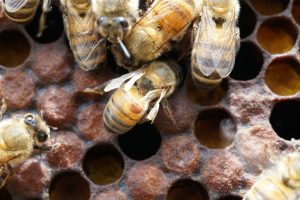Varroa destructor is no stranger to beekeepers around the world. In August 2023, a product (Amiflex) representing a new formulation of amitraz was registered in many states the United States, including Florida. After receiving many questions about Amiflex, here are some things you should know (*Note, this blog is only for registered beekeepers located in Florida):
- Amiflex (a restricted use pesticide) is currently registered in Florida. It is a 2% amitraz flash-treatment. The gel formulation is what distinguishes it from the 3.33% slow release Apivar strips. The process of Amiflex application is similar to that of using of a caulk gun. This product cannot penetrate wax cappings, so the treatment only targets mites on adult bees. You can find the label here: https://www3.epa.gov/pesticides/chem_search/ppls/087243-00004-20230331.pdf
- Please note: This is not a silver bullet for mite control. Do not forget to rotate active ingredients to avoid the development of mite resistance to amitraz, monitor for your mites before AND after treatment, and implement integrated pest management strategies. See: https://edis.ifas.ufl.edu/publication/IN1257
- To purchase and apply this product (regardless of how many colonies you manage), you must possess either a Private Applicator Agriculture License Category (1C) or Commercial Applicator License- Agricultural Animal Category (1B). For more information, visit: https://ccmedia.fdacs.gov/content/download/114429/file/licensure-requirements-for-beekeepers-using-rups.pdf
- Recordkeeping is necessary for beekeeper to comply with rules and regulation. A “Suggested Pesticide Recordkeeping” template can be found in the link above.
- Questions about license, renewal, and enforcement in Florida can be directed to the Florida Department of Agriculture and Consumer Services (FDACS), Division of Agricultural Environmental Services (AES), Bureau of Licensing and Enforcement, Pesticide Certification Section: 850-617-7870
- Questions regarding materials and testing can be directed to the University of Florida, Institute of Food and Agricultural Sciences (UF/IFAS) Extension Pesticide Information Office: pested@ifas.ufl.edu

This blog was written by Amy Vu and reviewed by Dr. Jamie Ellis (UF/IFAS Honey Bee Research and Extension Laboratory) and Caitlin Gill (Division of Agricultural Environmental Services, FDACS)
 3
3
